-
 Art of Wellness Acupuncture & Traditional Chinese Medicine (TCM)11704 Wilshire Blvd, Suite 295, Los Angeles, CA, 90025
Art of Wellness Acupuncture & Traditional Chinese Medicine (TCM)11704 Wilshire Blvd, Suite 295, Los Angeles, CA, 90025
myartofwellness@gmail.com310-451-5522 Office Hours
MonClosedTue7:30 am --4 pmWed7:30 am --4 pmThu7:30 am -- 4 pmFri7:30 am -- 4 pmSat7:30 am -- 4 pmSunClosedOur office opens from Tuesdays to Saturdays 7:30 am to 4 pm, will be closed on Memorial day, Independent day, Labor day, Thanksgiving day, Christmas and New year.
-
Recent Posts
- Chinese New Year 2026: Year of the Horse
- Acupuncture and TCM Treatment for Perimenopause Symptoms
- How to Treat Insulin Resistance With Acupuncture and TCM
- How to Treat Metabolic Syndrome With Acupuncture and TCM
- How to Treat Syncope With Acupuncture and TCM
- How to Treat Thoracic Outlet Syndrome With Acupuncture and TCM
- How to Treat Dupuytren’s Contracture With Acupuncture and TCM
- How to Treat Nutcracker Syndrome With Acupuncture and TCM
- How to Treat Rosacea With Acupuncture and TCM
- How to Treat Perioral Dermatitis With Acupuncture and TCM
- Lymphatic Drainage With Acupuncture and TCM
- How to Treat Turf Toe With Acupuncture
- How to Treat Nerve Pain With Acupuncture and TCM
- How to Treat Watery Eyes With Acupuncture and TCM
- How to Treat Ovarian Cysts With Acupuncture and TCM
- How to Treat Dystonia With Acupuncture and TCM
- Sign up to receive news and updates and get my free report:“The Top 10 Reasons to Try Acupuncture”

November 2025 M T W T F S S 1 2 3 4 5 6 7 8 9 10 11 12 13 14 15 16 17 18 19 20 21 22 23 24 25 26 27 28 29 30
Diet
How to Treat Hemorrhoids With Acupuncture and TCM
By Xiaomei Cai, L.Ac., Ph.D. & Qineng Tan, L.Ac., Ph.D.
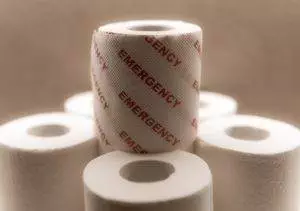
Bleeding and discomfort when you go to the bathroom? Burning or itching around the anus? Hemorrhoid pain is caused by swollen blood vessels around the rectum. Acupuncture and TCM reduce inflammation and can bring swift hemorrhoid relief.
Sometimes called “piles,” (from the Latin “pila,” meaning “balls”), hemorrhoids often do resemble little balls or clusters of grapes. The word “hemorrhoid” actually refers to the specific formation of blood vessels and cushioning tissues that surround the anus. Colloquially, though, the term is usually used to describe the condition of inflammation and irritation that can occur in this area.
Hemorrhoids are very common; probably more than half the population experiences them at some point in their life. However, the discomfort of talking to a doctor about hemorrhoids can be almost as miserable as the physical discomfort of having them, so many people avoid getting hemorrhoid help.
How do you know if you have a hemorrhoid? Sometimes people have a lot of itching, burning and discomfort after a bowel movement, or throughout the day. Sometimes there is no pain, but you may see a little bit of blood in the toilet bowl, or when you wipe with toilet paper. When you touch the area, you may feel a lump, or swollen tissue.
Hemorrhoids are generally classified into two categories based on their location: internal hemorrhoid and external hemorrhoid. Internal hemorrhoids form inside the anus and lower rectum and can cause bleeding, usually without pain. In some cases, though, the swollen veins can protrude out from the anal sphincter during or after a bowel movement and then need to be pushed back in. This is called a “prolapsed internal hemorrhoid.” The situation can become more serious if the internal hemorrhoid can’t be pushed back in, or if a blood clot develops in the vessel (thrombosis); then, it becomes painful to go to the bathroom, or even sit. In some cases, a prolapsed hemorrhoid becomes “strangulated,” meaning the blood supply is cut off, which can cause severe pain. Hemorrhoids become prolapsed because the connective tissues in the area weaken due to intense pressure, usually due to straining during a bowel movement, or because of the extra weight of pregnancy or obesity.
External hemorrhoids develop outside the anus, under the skin. These are the kind of hemorrhoids that tend to cause itching and a little bit of bright red bleeding. Again, they are aggravating, but not too serious unless a blood clot forms; then, it is called a “thrombosed external hemorrhoid.” This type of hemorrhoid can turn blue or purple in color and become acutely painful. In some cases, surgery will be performed to drain blood from the clot, or remove the hemorrhoid.
Most of the time, people suffer quietly with hemorrhoids, waiting for them to go away on their own. Only when they cause severe pain and bleeding are medical treatments considered. However, TCM and acupuncture offer a way to deal with hemorrhoids so that they heal more quickly and reduce the chance to return.
Top 10 Hemorrhoid Causes

What causes hemorrhoids? The tissues and blood vessels around the anal area can become weak, irritated, and inflamed. The upright posture of our human bodies naturally puts pressure on the elimination organs. Many women get hemorrhoids during pregnancy and/or birth because of intense pressure on the perineal area.The major reasons for hemorrhoids include:
- Pregnancy
- Constipation
- Diarrhea
- Sedentary lifestyle
- Straining while on the toilet
- Sitting too long on the toilet without progress
- Lack of dietary fiber
- Obesity
- Family history of hemorrhoids
- Aging
Overall, focusing on eating a diet that includes plenty of fiber, drinking enough water, maintaining good bathroom habits (going when you feel the urge and not waiting) and a healthy weight will go a long way towards preventing hemorrhoids. But what can you do when you already have hemorrhoids?
Treatment for Hemorrhoids

Often, people will just deal with hemorrhoid itching and pain on their own by using over-the-counter products like creams that contain phenylephrine, which constricts blood vessels (Preparation H), or disposable wipes impregnated with witch hazel and other soothing ingredients (Tucks medicated pads). These treatments may help reduce pain and swelling temporarily, but they do not get rid of hemorrhoids at their root.
When people do talk to their doctor about hemorrhoids, they may be prescribed something stronger, like a steroid cream, or hydrocortisone rectal suppositories.
If the situation persists or becomes more severe, there are several types of outpatient procedure to treat hemorrhoids, including rubber band ligation, sclerotherapy, infrared photocoagulation, and electrocoagulation. All of these procedures cut off blood supply to the hemorrhoid, so that it will form scar tissue and fall off. Hemorrhoid stapling and hemorrhoidectomy are outpatient procedures in which the hemorrhoids are surgically removed, and/or prolapsed tissues are affixed back inside the anus. While these surgeries may be helpful in some cases, recovery can be painful, and there can be problems with the way things work afterwards, potentially leading to more surgery later on.
When hemorrhoids are severe, it is a good idea to consult your doctor, as there are more serious conditions that may produce similar symptoms of pain, itching, or bleeding, including anal fissure (torn tissue or open sore in the anus due to trauma or Crohn’s disease complications), anal abcess (infected cavity in the anus) or anal fistula (an opening from the anal or rectal area that drains pus and/or fecal matter). Sometimes skin tags develop around the area where a hemorrhoid has healed. These can be irritating and difficult to keep clean, so they may need to be surgically removed.
For the treatment of hemorrhoids, TCM methods can provide relief from symptoms and help to reduce the inflammation that caused them.
Can Acupuncture Help Hemorrhoids?
According to TCM philosophy, hemorrhoids can often be related to a build-up of heat and/or dampness in the lower abdominal area; it’s the heat and dampness that cause the blood vessels to swell. You might be concerned by the idea that acupuncture treatment for hemorrhoids would involve needles being placed in a highly sensitive, private area. Let us reassure you this is not the case. The Du Mai meridian, also known as the “Sea of Yang,” is the channel which runs from the rectum area up along the spine to the top of head and then down to the mouth, controlling Yang energy throughout the body. We use points along this meridian, on the top of the head, and in other parts of the body to draw excess heat and dampness away from the area where the hemorrhoids are.
Other presentations of hemorrhoids include:
Top 5 Types of Hemorrhoids Presentation in TCM
- Spleen Qi Deficiency – This is when people tend to have poor digestion, bloating, gas, and diarrhea, going to the bathroom very often; the hemorrhoids feel swollen, but not as red. We use moxibustion to work on stomach point 36 meridian point, CV points 6 and 4, and spleen 6 in the middle of the abdomen to help digestion.
- Spleen Qi Sinking- This presentation tends to happen to people who are thinner, not only having hemorrhoids, but all the organs tend to be lower than usual; may also have prolapsed bladder or uterus, and poor digestion. Moxibustion applied to the middle of the top of the head will head the Qi rise up. For both types, doing Kegel type exercises regularly can help to strengthen the rectal area, also the uterus and bladder. Do three sets, increasing a bit every time: for example squeeze 30 times, release, do again 35, rest, next 40, then rest. Do this exercise every morning and evening.
- Blood Stasis – This type is more and more common because of our modern lifestyle, due to sitting a lot for work, which causes blood circulation to be compromised. In Chinese, we have a proverb: “for 10 people who sit too long, 9 will have hemorrhoids.” These manifest more as red, swollen, maybe bleeding. Kegels will also be helpful here, too.
- Lower Jiao Fire/Heat – This is when the lower part of the body has too much fire. For this type of hemorrhoids, people tend to have more bleeding, especially triggered by having alcohol, spicy food, crunchy food. These are the kind that may feel very sore with a burning sensation and tend to bleed, especially when wiping.
- Intestinal Dryness – especially here in California, where we have hot, dry weather, without a good habit of drinking water, people can tend to constipation, even going only once or twice a week. These types of hemorrhoids are due to dry, uncomfortable bowel movements, and may have itching and bleeding. Adding more water (warm is better) and more moisturizing foods (sesame oil and lots of ripe bananas, flax seeds, chia, sweet potato/yam, prunes) will be helpful.
Kegel type exercise is helpful for all of these types, to strengthen the sphincter muscle and bring more circulation to the area. Add more movement overall. At bedtime, leg lifts, bicycle movements in the air, upside down, are a good way to exercise without putting pressure on the lower body.
Ideally, when there is good digestion, between 5:00 – 7:00 a.m. is when people should naturally want to go, quickly, without too much need to push. Sitting on the toilet for too long creates the pressure that leads to hemorrhoids.
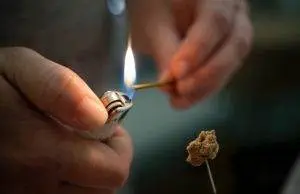
Moxibustion treatment–the burning of the herb mugwort near an area–can be very effective for reducing pain quickly. Chinese herbal formulations, used both internally and externally, can help relieve inflammation and pain. An herbal tea formula may include herbs to help strengthen the energy of the spleen, and to lubricate the digestive tract.
We also recommend sitz baths as a home remedy for hemorrhoids: short, 15-minute baths in warm water, to help soothe the area and keep it clean. Your acupuncturist may give you an herbal bath sachet to use to help reduce inflammation and soother the tissues.
One study of acupuncture treatment for internal hemorrhoids showed that, after 24 days, 86% of patients were “cured,” while another 8% showed significant improvement.
Your acupuncture practitioner will also talk with you about changes you can make in your diet and bathroom habits that will help you get things moving more easily.
Acupuncture Near Me for Hemorrhoids
Hemorrhoids are not only irritating; they are a sign that you may need to pay more attention to what you’re eating, and that you need to give yourself a little more time for relaxation, in and out of the bathroom. A combination of acupuncture, herbs, and other TCM treatment for hemorrhoids can help get the pain and swelling behind you.
*This article is for education from the perspective of Traditional Chinese Medicine only. The education provided by this article is not approved by FDA to diagnose, prevent, treat and cure human diseases. It should not stop you from consulting with your physician for your medical conditions. Traditional Chinese Medicine is based on Qi, which is an invisible force that usually cannot be observed by modern science. Because science focuses on testing ideas about the natural world with evidence obtained through observation, these aspects of acupuncture can’t be studied by science. Therefore acupuncture and Chinese herbs are often not supported by double-blind, randomized trials, and they are considered alternative medicine therapies in the United States.
How to Treat Heel Pain With Acupuncture and TCM
By Qineng Tan, L.Ac., Ph.D. & Xiaomei Cai, L.Ac., Ph.D.
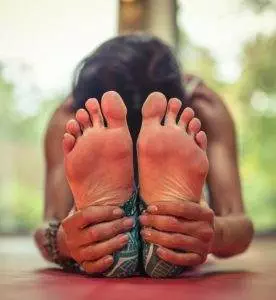
Chronic bottom of heel pain, especially when you first get up in the morning? Heel pain can be due to plantar fasciitis, an inflammatory condition of the large ligament that supports the arch of the foot. Bone spurs in the foot (heel spur), Achilles tendonitis, and bursitis can also cause pain in back of heel. Acupuncture and TCM treatment offer relief from chronic plantar fasciitis pain and achilles tendon pain.
Experiencing stiffness or pain in the heel when you first get up in the morning is a sign of plantar fasciitis. The sensation may improve as you warm up and move more throughout the day, or you may have severe, burning pain whenever you put your weight on the back part of your foot. The plantar fascia provides shock absorption and cushioning for the heel; when it is overused, small microtraumas and tears lead to inflammation. People with very flat feet, fallen arches, or very high arches are more prone to plantar fasciitis, as are older people.
Stiffness above the heel is an indication of Achilles tendinitis. When the tendon that connects the muscles of the calf to the heel bone is strained, it can cause an aching sensation or pain in the back of the heel. This usually happens because of sudden overuse, like when a person decides to go for a long run when they haven’t exercised in a while, or when their sneakers are worn out. Achilles tendinitis is more common in men, and in people with high blood pressure.
Stiffness in the ankle and side of foot pain can be due to posterior tibial tendonitis, which can develop when the heel bone shifts in such a way as to put extra stress on the outside of the ankle.
Heel spurs–extra bone tissue on the bottom or back of the heel–develop due to over-stress of the foot. In most cases, the bone spurs on the foot don’t cause pain in and of themselves, but they often coincide with either plantar fasciitis or Achilles tendonitis, and the conditions aggravate each other.
TCM modalities of acupuncture, electro-acupuncture, moxibustion, and herbal formulae have been shown to help relieve heel pain and inflammation due to all types of conditions, including plantar fasciitis and Achilles tendinopathy.
Top 5 Heel Pain Causes
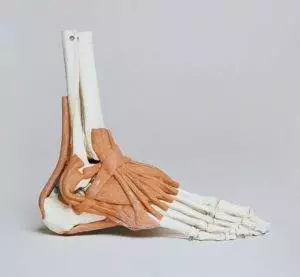
Pain in the heel and other types of bottom of foot pain can be due to one of or a combination of several different types of conditions:
- Plantar fasciitis – about 2 million people are diagnosed in the U.S. each year with plantar fasciitis, which occurs when the connective tissues that support the bottom of the foot become inflamed, usually from repetitive use or being overloaded. Some athletes are prone to this type of inflammation due to constant stress on the foot. Health conditions like obesity and diabetes also make people more susceptible to plantar fasciitis heel pain. While this type of heel pain walking is generally attributed to inflammation, it is also due to the natural degeneration of collagen that occurs with age, making the connective tissues weaker and more brittle.
- Heel spur – (bone spurs foot) refers to the extra growth of bone tissue on the bottom of the calcaneus (bone spur heel). Heel spurs often grow as the body’s reaction to plantar fasciitis; the two conditions can exist together or separately. Sometimes people with heel spurs aren’t aware of them, but bone spurs foot can cause sharp bottom of foot pain. Heel spurs often develop because of the stress of running or jogging, or wearing improper footwear. Posterior calcaneal exostosis, colloquially known as “pump bump”, is when there is abnormal growth of bone tissue on the back of the heel, usually due to wearing a certain style of shoe (pumps or high heels).
- Bursitis – Bursa are small sacs of fluid that help to provide cushioning in various joints of the body. Calcaneal bursitis occurs when the bursae that sit between the Achilles tendon and the heel bone become inflamed. Heel bursitis is usually caused by too much impact on the ankle joint and heel while running or by wearing shoes that create a lot of pressure on the back of the heel.
- Achilles tendonitis – (also spelled achilles tendinitis) When the tendon that runs from the heel up the back of the lower leg becomes inflamed, often due to a lot of jumping movements, it can create pain and stiffness in the back of the heel. This overuse injury is very common in middle aged adults who engage in sports like tennis or basketball only sporadically, and may not warm up adequately before running and jumping.
- Gout – an arthritic condition in which a buildup of uric acid crystals causes swelling and pain in the joints of the foot.
Pain in the heel can also be caused by a pinched nerve, or compression of the plantar nerve, or by bruising on the heel. Peroneal tendonitis, when the tendon that runs along the side of the ankle and then under the foot becomes inflamed and swollen, can also cause pain in the back of the heel. Sciatic nerve pain can also cause radiating pain that shoots down the leg and causes pain in the foot.
What Is the Treatment for Plantar Fasciitis?
Conventional clinical medicine considers plantar fasciitis to be a self-limiting condition, which means that it will eventually improve on its own, with rest and modifications of movement. Doctors will usually recommend that people cease weight-bearing activities as much as possible. This can be extremely frustrating for patients, though, as it often means being advised to rest the foot for six to eighteen months. Physical therapy for plantar fasciitis that focuses on stretching and strengthening the plantar ligament may be recommended. Special orthotics, arch supports, or heel cups that provide cushioning can be helpful. Night splints are sometimes used to keep the foot and ankle in a position that keeps the ligament on the bottom of the foot stretched long, rather than shortened, while sleeping.
For heel pain relief, doctors may administer steroid injections and other anti-inflammatory medications. Steroid injections do carry some risks; about one out of ten patients treated this way for plantar fasciitis pain experience a rupture of the plantar tissues, which can lead to an even more severely chronic condition. Of course, the problem with taking NSAIDS on a regular basis is that they can cause problems with the stomach lining and gastro-intestinal bleeding. If rest and other methods do not improve the situation after many months, then surgical release of the plantar fascia may be considered.
Achilles tendonitis treatment is usually similarly conservative, involving rest and pain relievers. Unfortunately, recovery from the heel pain caused by plantar fasciitis or Achilles tendinitis is often a long, tedious process of abstaining from physical activity. For many people, whether they have jobs that require them to be on their feet or simply enjoy engaging in sports, it may feel impossible to stick to the standard treatment program. Acupuncture treatment offers a way to help relieve pain and inflammation and speed the healing of plantar fasciitis.
Acupuncture for Heel Pain
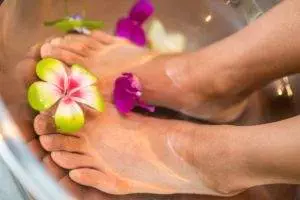
TCM takes a holistic view of pain conditions such as heel pain. While undoubtedly heel pain is caused largely by inflammation in the soft tissues of the foot and calf, there are often other underlying factors that cause these kinds of injuries to happen to people in middle age. In TCM philosophy the kidneys are believed to provide support and nourishment to the bones; this concept is called “kidney governing bone.” Heel pain and heel spurs occur due to deficiencies or excesses of the kidney Qi. Soft tissues such as the plantar ligament and the Achilles tendon are governed by the liver. Thus, acupuncture treatment for heel pain, heel spurs, plantar fasciitis, and Achilles tendinitis will often involve using acupoints to strengthen and tonify the Kidney Qi and Liver Qi.
Acupuncture is known to be effective for helping to relieve pain due to inflammatory conditions of all kinds, and also for helping to increase the production of collagen, which helps to keep the connective tissues of the foot and calf strong and supple. Acupuncture helps the healing of ligaments and tendons by improving reducing inflammation, improving blood flow and cell repair. The ancient textbook of Chinese medicine, The Yellow Emperor’s Classic of Internal Medicine, even describes a specific acupuncture technique used to promote healing in the Achilles tendon.
Herbs can be used both internally and externally to help heel pain. An herbal formula that is steeped in warm water and used as a daily foot soak can be especially helpful for relieving swelling in the heel and pain in the bottom of the foot.
One research study compared patients treated with corticosteroid injections for plantar fasciitis versus patients treated with acupuncture. Six months later, the patients who had steroid shots reported a 76% effective rate, while the patients who’d had acupuncture reported a 97% effective rate.
A hospital study compared two groups of patients – some treated with integrated protocol of acupuncture and warm herbal foot baths, and the others treated with the herbal foot baths only. The effective rate for the foot-soaking only was 69%, and the effective rate jumped up another 22% for the patients who also had acupuncture.
A systematic review of four studies involving acupuncture for patients with plantar fasciitis heel pain showed a significant reduction in pain after 4-8 weeks of treatment.
Top 5 Tips for Heel Pain
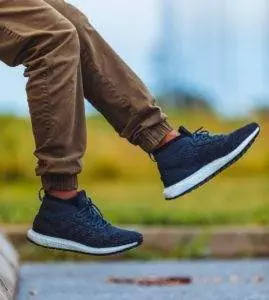
Prevention of heel pain involves mindfulness around your preparations for physical activity. The right gear and the regular practice of plantar fasciitis exercises can help prevent injury to the tendons of the foot.
- Wear good-fitting, properly supportive shoes – whenever you walk, run, or work out. Replace them regularly, even if you haven’t worn them much, because cushioning materials can break down over time, even when the shoes are just sitting in your closet.
- Warm up – taking the extra time to warm up before and cool down after running and jumping is always important, for all of the muscles of the body, but especially for the feet and lower legs. Be sure to adequately warm up the calf muscles, and stretch them before and after your primary workout.
- Vary your workout – cross-training, which means alternating different types of activities, not only helps to improve your overall cardiovascular and muscular fitness, but it also prevents repetitive use injuries that can occur when you run every day. Focus on resting the feet some days, by riding your bike or swimming instead of running or doing high-intensity aerobics.
- Soak your feet – before bed, soak heels in warm water to help improve circulation.
- Manage your weight – Heel pain is usually related to how much pressure the foot has to withstand on a daily basis. Maintaining a lower body weight will help take the pressure off the heels. Losing weight while being asked to stay off your feet can be especially difficult, so talk with your TCM provider about a healthy food plan for weight loss.
Once your heel pain has improved, you will need to take these steps to prevent heel pain from returning in the future.
Acupuncture Near Me for Heel Pain
The typical treatment for heel pain can last for several months, with unpredictable results. If you have been suffering from plantar fasciitis or Achilles tendonitis, and want to heal from heel pain more quickly, it is worth it to give acupuncture a try. At Art of Wellness, we have over 30 years of experience helping patients get relief from pain conditions of all kinds. Get back on your feet again with acupuncture for heel pain!
*This article is for education from the perspective of Traditional Chinese Medicine only. The education provided by this article is not approved by FDA to diagnose, prevent, treat and cure human diseases. It should not stop you from consulting with your physician for your medical conditions. Traditional Chinese Medicine is based on Qi, which is an invisible force that usually cannot be observed by modern science. Because science focuses on testing ideas about the natural world with evidence obtained through observation, these aspects of acupuncture can’t be studied by science. Therefore acupuncture and Chinese herbs are often not supported by double-blind, randomized trials, and they are considered alternative medicine therapies in the United States.
How to Treat Bloated Stomach With Acupuncture and TCM
By Xiaomei Cai, L.Ac,. Ph.D. & Qineng Tan, L.Ac., Ph.D.
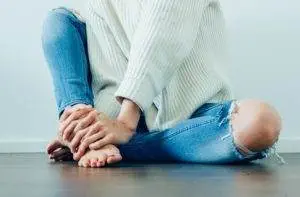
Do you feel constantly gassy or have a bloated stomach after eating? Digestive problems like gastritis or colitis can cause abdominal bloat. Stress and hormonal imbalances can also contribute to inflammation and bloated stomach pain. Acupuncture and TCM herbs can help improve digestion and relieve abdominal bloating.
Abdominal bloating occurs when gas builds up in the gastrointestinal tract, filling the stomach and/or intestines with air. This can cause the belly area to get swollen and distended. Bloating can cause an inflated belly, sharp pain in the abdomen, belching and flatulence, nausea, or a sudden strong urge to go to the bathroom. Bloating can be related to fluid retention; this is sometimes called “water bloat.”
Problems with digestion that lead to a feeling of heaviness, “like a rock” in your belly after eating, are common. People who have been diagnosed with some type of functional gastro-intestinal disorder (FGID)–like irritable bowel syndrome (IBS) or dyspepsia (indigestion)–are extremely likely to experience abdominal pain and bloating after eating, while up to 30% of all people report having bloating at least some of the time. Inflammation in the walls of the stomach (gastritis) or intestine (ulcerative colitis) can also cause bloating.
Women often feel bloated before or during their menstrual period, and female reproductive disorders like endometriosis, fibroids (leiomyoma of the uterus), and PCOS (polycystic ovarian syndrome) can cause abdominal pain and bloating.
FGIDs can be very hard to manage; it may be difficult to get a clear diagnosis or effective medical treatment. Problems like constipation, diarrhea, nausea, abdominal pain and bloating are highly subjective, and people are often made to feel like it’s normal to have these issues, or that all they need to do is avoid certain foods.
Feelings of anxiety and depression are common among people who suffer from moderate to severe bloating on a regular basis. This can become a vicious cycle, as the pain and swelling of the abdomen causes anxiety, and the physiological effects of the emotional stress trigger the bloating to happen again and again. Sometimes people dread eating meals because they are so afraid of the painful and embarrassing bloated stomach.
Digestive upsets are complex to treat because there can be many factors contributing to the discomfort. So many different conditions can cause bloating, it can be hard to get a clear handle on the true cause. This is a case when TCM methods of diagnosis offer many advantages, because a TCM practitioner will be able to study the whole picture presented by a patient and pinpoint what underlying conditions are causing gas and distension. Acupuncture and herbs can help resolve abdominal bloating and other symptoms at their root source.
Top 10 Abdominal Bloating Causes

Why might someone feel bloated and gassy all the time? Many different types of gastrointestinal disorders can contribute to a bloated belly and excess gas, as can hormonal and emotional changes. What causes abdominal bloating can be one issue or a combination of factors:
- Irritable Bowel Syndrome (IBS)
- Inflammatory bowel disease, Ulcerative colitis or Crohn’s Disease
- Gastritis, stomach ulcers, inflammation of the stomach
- Food intolerance, gluten intolerance, celiac disease
- PMS, menstruation
- Stress, anxiety, depression
- Pregnancy
- Constipation
- Liver disease
- Abdominal adhesions, or scar tissue from surgeries
Eating behaviors like eating too quickly, swallowing air while eating, or eating fiber-rich foods that cause gas like beans, can lead to bloating. Drinking a lot of carbonated beverages can lead to excess gas in the GI tract. Smoking can also be a factor. Some medications can cause bloating as a side effect, including antibiotics, oral birth control pills, opioid pain medications, medicines to relieve constipation, and even some supplements, like iron pills.
Cancers of the abdominal organs, such as ovarian cancer, stomach cancer, colon cancer, or pancreatic cancer, can also cause bloating in the belly. Gallstones or gallbladder disease, gastroparesis, kidney problems, and liver problems can all cause stomach pain and bloating.
Medical Treatment for Abdominal Bloating
Many people do not seek medical help for bloating, trying to manage it on their own with over the counter medications that promise relief from gas pain and acid reflux. Antacids only help with the kind of bloating that is caused by food, though; they don’t help with bloating related to FGIDs, hormones, or emotional stress. When a person does ask their primary care doctor or even a gastroenterologist for help with bloating, they may find that the treatment options are very limited. Doctors will usually reassure patients that gas and bloating, while uncomfortable, are not actually dangerous. Then, they will often advise that patients go on a strict elimination diet, cutting out wheat, dairy, and most vegetables and legumes. Sometimes doctors will prescribe antibiotics to alter the balance of gut bacteria. Antidepressants are sometimes prescribed to help with bloating. Conventional medical science still has a ways to go to fully understand the underlying causes of digestive problems like bloating.
Because bloating is not viewed as a disorder in and of itself, not much serious research has been done to show what types of treatments work best to get rid of bloating. TCM treatment has been shown in a randomized controlled trial, a peer-reviewed study, and a hospital-based investigation to help in relieving stomach pain due to chronic gastritis.
How Can Acupuncture Help With Bloating?
TCM offers a multidisciplinary approach to the digestive problems, hormone imbalances, and emotional upsets that can cause bloating. An experienced acupuncturist is able to use methods of diagnosis such as studying the appearance of the tongue, feeling the pulse, and asking lots of questions about how and when the symptoms occur to find the specific pattern of imbalance that is causing gastric distress.
Different presentations of digestive conditions that may cause abdominal bloating and pain include:
- Spleen/Stomach Deficiency – characterized by symptoms: chronic bloating, poor appetite, feel worse after eating, pallor, and fatigue. This type of bloating can be caused by antibiotics, too much raw or fermented food, eating disorders, a long period of illness, or chronic inflammatory disorders.
- Damp-Phlegm – symptoms include: distended stomach, nausea, acid reflux, diarrhea. This type of bloating can be caused by dietary habits that include excess sugar, alcohol, fatty or fried foods, and dairy products. Can also be related to damp environmental conditions.
- Liver Qi stagnation – common symptoms are: stomachaches, stomach gurgling, belching, and constipation. This type of bloating can be caused by stress, feelings of anxiety or anger, and irregular, emotional eating behaviors.
TCM treatment for abdominal bloating will use acupuncture and herbs to bring the stomach and liver back into harmonious function, clearing phlegm and improving digestion. Treatment will be individualized based on the underlying causes of the imbalance; if reproductive hormones are involved, then that factor will be taken into consideration when preparing the herbal formula. If mental health issues are a factor, specific points will be added to help relieve anxiety. Naturally, your acupuncturist will have some clear instructions on how to optimize your nutrition to reduce bloating.
Top 5 Tips for How to Stop Bloating

While bloating may be caused by all sorts of different factors, there is no doubt that making some changes to your eating habits will probably have an impact on how bloated you feel. What helps bloating may be different for each person’s constitution or lifestyle, so it will be very helpful to have an in-depth conversation with your acupuncture provider about what bloating diet is best for you.
- Chew your food thoroughly. Many people eat fast, and don’t pay much attention to chewing their food well before they swallow. Food is really meant to be broken down and mixed with saliva in the mouth before it moves down the esophagus and into the stomach. Skipping this important step by swallowing half-chewed food means that your stomach has to produce more acid and work much harder to digest the food before it moves deeper into your gastrointestinal tract. Eating too quickly can also easily lead to eating more than you need. It takes about 20 minutes for your brain to receive the message that the stomach is full. Chew slowly, and enjoy every bite; this will improve your digestion.
- Avoid icy cold drinks and foods. Cold liquids are shocking and unfriendly to your internal organs, both those of the digestive tract and the female reproductive organs. Constantly drinking ice-cold beverages irritates the smooth muscle tissues of the stomach, intestines, and uterus. Drink more warm liquids, which are soothing to these organs.
- Ginger tea – many of our herbal formulations include slices of fresh ginger to help soothe the stomach and GI tract. Ginger helps the body to produce more of the digestive enzymes that work to break down food, and relieves cramping in the belly. All you need to do is keep a knob of fresh ginger on hand, cut two or three slices and steep in hot water as you would a teabag. Sip anytime, but especially before meals, to help relieve gastritis pain and bloating.
- Choose foods in harmony with the season. Raw foods are appropriate in the summer, but in the winter, it’s better to eat cooked foods. Eating more bitter-tasting foods, like dark leafy greens, helps the liver and kidneys.
- Use acupressure to help relieve bloating and gassiness. Acupoints are located along the meridians and correspond to various organ systems. Applying gentle, steady, downward pressure to acupoint ST36 (Zu San Li), which is associated with the stomach, can help to relieve bloating, stomach pain, nausea, and feelings of stress. ST36 is located on the outer edge of the shin bone, about 4 finger widths beneath the kneecap.
Acupuncture Near Me for Abdominal Bloating
TCM offers a holistic approach to digestive problems of all kinds. Symptoms like abdominal bloating, stomach pain, and gassiness are usually signs that there is a deeper problem. If you haven’t been able to solve the problem of bloating with conventional medicine or dietary changes, you may be able to get help for digestive difficulties with acupuncture and herbs.
*This article is for education from the perspective of Traditional Chinese Medicine only. The education provided by this article is not approved by FDA to diagnose, prevent, treat and cure human diseases. It should not stop you from consulting with your physician for your medical conditions. Traditional Chinese Medicine is based on Qi, which is an invisible force that usually cannot be observed by modern science. Because science focuses on testing ideas about the natural world with evidence obtained through observation, these aspects of acupuncture can’t be studied by science. Therefore acupuncture and Chinese herbs are often not supported by double-blind, randomized trials, and they are considered alternative medicine therapies in the United States.
How To Treat ED With Acupuncture and TCM
By Qineng Tan, L.Ac., Ph.D. & Xiaomei Cai, L.Ac., Ph.D.
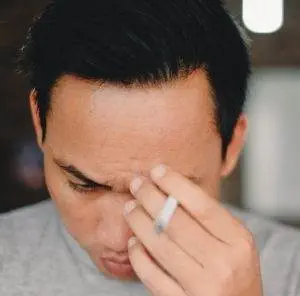
Let’s face it: most men have probably had trouble getting hard on occasion, but if it’s happening 50% of the time, or more often, then it may be a sign of men ED, or erectile dysfunction. ED refers to the inability to get or maintain an erection, making it difficult to have sexual intercourse. Acupuncture and TCM offer a natural solution for low sex drive and reproductive health problems, without over the counter ED pills.
In the past few decades, this condition, which used to be referred to as “impotence,” has come to be perceived as a men’s health issue or a men’s fitness issue that can be treated medically, rather than a personal problem. While it’s great that men can get help from doctors for this condition without embarrassment or shame, ED medications may not solve the problem for everyone. Stress, hormones, nutrition, exercise, emotions, and relationship dynamics all play a role in ED. ED can have a serious impact on a man’s quality of life, as it affects self-esteem, romantic relationships, and sperm count, and fertility.
It is estimated that about 30 million men in the U.S. experience erectile dysfunction (ED). By age 60, over 40% of men will probably experience ED. While ED drugs and over the counter ED pills help some men with ED symptoms, many men cannot use these medications because they interfere with others that are commonly used to treat heart disease. Acupuncture and TCM provide an alternative treatment for ED that can help men with this issue.
Top 10 Causes of ED
ED is a complex problem, which can involve both physical and mental components. A physical problem that causes a man to experience ED a few times may lead to emotional stress around sex and low sex drive, making the problem worse. Because the brain and hormones contribute so vitally to arousal and erection, sometimes depression, anxiety, or interpersonal feelings are the main cause of the issue. Some of the most common physical causes of ED include:
- Heart problems, high blood pressure, clogged arteries, high cholesterol
- Diabetes
- Obesity
- Use of certain prescription medications (antihypertensives, antidepressants)
- Neurological conditions, such as Parkinson’s disease or Multiple Sclerosis
- Alcoholism or excessive consumption of alcohol
- Smoking cigarettes/tobacco
- Prostate problems like BPH (enlarged prostate), or prostate cancer
- Lack of sleep, sleep disorders
- Low testosterone
Sometimes erectile dysfunction is the reason men discover that they have a heart condition or diabetes that they didn’t realize they had. When high cholesterol causes plaque to build up in the blood vessels, it’s not only the heart that is affected. Atherosclerosis (narrowing of the arteries) can also affect a man’s ability to get an erection by restricting blood flow to the penis. Inability to maintain an erection can be a sign that a man has hypertension.
What Is the Treatment for ED?
The most common medical treatment for men with ED are PDE-5 medications (like Viagra, Cialis, or Levitra), which work to dilate the blood vessels that supply blood to the penis. These ED drugs lower the blood pressure, which is why they cannot be used in conjunction with some other medications, including nitroglycerin or Imdur. If a man were to take both his ED pills and these medications, it could cause dangerously low blood pressure.
Some men experience side effects of taking these ED meds, including: headaches, blurred vision, dizziness, hot flushes, muscle pain, and diarrhea. In rare cases, men may have a painful erection that lasts longer than four hours (priapism), which can require medical treatment and/or cause permanent damage. If necessary, a doctor may numb the penis and use a needle to drain the blood that is trapped there, or use decongestant medications to help relieve the swelling. Other forms of therapy for ED include penile implants and penile injections. TCM acupuncture treatment for ED does not involve any needles inserted into the penis itself.
How Can Acupuncture Help ED?

According to TCM theory, ED is classified as a Jin Wei disorder and can follow one of a few patterns:
- Liver qi stagnation
- Blood stasis
- Kidney deficiency
TCM also acknowledges that stress, emotional and mental health disturbances are often a primary cause of ED, and seeks to incorporate counseling and awareness-building, both with the patient, and with the patient’s partner, if applicable. Sessions with a TCM provider usually involve plenty of discussion and feedback; patients feel heard and understood, which can go a long way towards relieving anxiety surrounding the ED or other sexual disorders.
TCM treatment for ED will include both acupuncture and herbs, which, combined, help to address the weakness or blockages that have developed around the liver and kidneys, strengthening the liver qi, relieving stagnation, and clearing dampness.
One study showed that, after a course of treatment including 3-5 acupuncture treatment sessions and daily herbal supplementation, almost half of the men reported satisfaction with the results.
Another study found that about two-thirds of the men who received TCM treatment reported feeling that they were “cure,” while the other third reported improved erections, but still felt that they needed more help. The group who received placebo treatment did not report improvement.
Top 5 Tips for ED Men’s Fitness

The desire to overcome ED and get your sex life back on track can be a great motivation to clean up your diet and get rid of habits you know have been holding you back from peak men’s health. Your acupuncturist can help you plan the best diet for men to help regulate hormones, reduce cholesterol, improve circulation, boost heart health and energy.
- Eliminate alcohol, tobacco, and other recreational drugs. You may feel like these substances help you to relax and get in the mood, but on a deeper physiological level, they are compounding the problem.
- Get more exercise. Ideally, balance cardio with some weight training. Losing fat and building muscle will help to balance the hormones and increase testosterone levels.
- Take care of your mental health and emotional well-being. Foster open and honest communication about ED with your partner. Acquaint yourself with men’s and women’s health issues, so that you can care for each other with empathy.
- Reduce stress. Prioritize a balanced, healthy lifestyle. Making time for yourself through regular exercise, meditation, and healing modalities like acupuncture can help improve your performance in all other areas of your life
- Get adequate sleep. When the body doesn’t get the deep rest it needs, it can lose all kinds of functionality.
Acupuncture Near Me for ED
ED is a sensitive men’s health issue. Knowing that it’s a common problem that affects lots of other men may help a little, but if ED is becoming a sexual problem that is negatively affecting your life and relationships, it’s worth it to seek out help for erectile dysfunction. If conventional medical treatment for ED isn’t working or isn’t an option, or if you want to take a more holistic approach that will help also boost your fertility and longevity, consider acupuncture treatment for ED.
*This article is for education from the perspective of Traditional Chinese Medicine only. The education provided by this article is not approved by FDA to diagnose, prevent, treat and cure human diseases. It should not stop you from consulting with your physician for your medical conditions. Traditional Chinese Medicine is based on Qi, which is an invisible force that usually cannot be observed by modern science. Because science focuses on testing ideas about the natural world with evidence obtained through observation, these aspects of acupuncture can’t be studied by science. Therefore acupuncture and Chinese herbs are often not supported by double-blind, randomized trials, and they are considered alternative medicine therapies in the United States.
How to Treat Candida With Acupuncture and TCM
By Xiaomei Cai, L.Ac., Ph.D., & Qineng Tan, L.Ac., Ph.D.
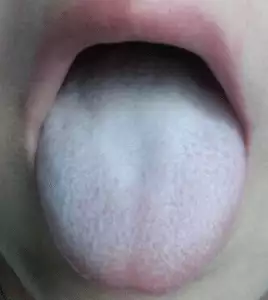
Why do I keep getting yeast infections? White patches on the tongue? It could be the common fungal infection Candida, also known as Candidiasis or a yeast infection. Candida infection can happen to people of all ages and in different parts of the body. Acupuncture and TCM Chinese herbs can help resolve recurrent yeast infections and thrush in the mouth.
Candida albicans, the species of candida fungus that most often causes candidiasis, is a type of yeast that naturally exists in the human body. When the population of candida is kept to normal levels, it causes no harm; in fact, it acts to help digestion and the absorption of nutrients from food. But when proliferation of the fungus gets out of control, candida can cause burning pain, redness and inflammation, and difficulty with normal processes like eating, digestion, and elimination. In extreme cases, candidiasis can cause serious illness.
Candida overgrowth most often happens in the mouth (known as “thrush”), or in the genital area (usually called a “yeast infection”). Thrush in babies’ mouth commonly affects very young infants, creating white or yellow patches or sores in and around the mouth that can affect feeding. Thrush in adults is less common, but can occur when someone’s immune system is weak (common among people living with HIV/AIDS), or if they wear dentures or use medications for dry mouth, causing the typical white patches, cracks in the corners of the lips, and burning sensations in and around the mouth and throat.
Most women have probably experienced a vaginal yeast infection at some point in their lives. This type of candida causes burning and itching in the vulva and vagina along with a white, clumpy discharge. Candidiasis can also affect men, causing an itchy rash on the penis.
Is candida or thrush contagious? It’s rare for a person to “catch” a fungal infection from another person, but it is possible, for example, for a person to pass a yeast infection to his or her partner through sexual contact. It is also possible for a mother to develop thrush on her nipples from nursing her baby who has oral candidiasis.
Candida overgrowth can affect other parts of the body, including the finger or toe nails (candidal paronychia), and especially areas of the skin that tend to be damp and sweaty, like the armpits or the creases around the groin.
In some cases, invasive candidiasis can get deeper into the body, infecting the gastrointestinal system or even getting into the bloodstream, which can lead to infection of various organs, including the eyes, heart or kidneys. This type of candida infection can become serious, causing fever, and even sepsis, which can be fatal.
Candida overgrowth creates different problems for different people. That is why TCM, acupuncture, and herbal medicine provide an excellent way to treat candida. TCM theory of candidiasis treatment allows for a highly individualized approach to each patient, so that we can get rid of yeast infections for good.
Top 5 Types of Candida Infection
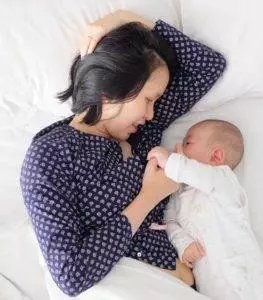
Candida overgrowth can occur in different parts of the body. The most common kinds of yeast infection or candida are:
- Oral candidiasis – also known as thrush in mouth, or yeast infection in the mouth. Thrush in babies usually occurs because the infection passes from the mother’s vaginal area to the baby during birth, and the infant’s immune system is not developed enough to fight it. What thrush on tongue looks like: white patches that can be wiped off.
- Vaginal candidiasis – commonly known as a vaginal yeast infection, candidiasis of the female genitals causes redness, burning, and “cottage cheese-like” discharge.
- Candidal balanitis – candida infection of the male genitals happens particularly in uncircumcised men. More recent research has led some medical professionals to believe that fungal infections may cause a prostate problem, infection in prostate, prostatitis symptoms, enlarged prostate symptoms, and symptoms to prostate cancer.
- Cutaneous candidiasis – or yeast infection on skin. Candida can cause diaper rash in babies, and red, itchy, peeling patches in areas where the skin has many folds and creases. Candidiasis can also infect the fingernails, toenails and nail beds.
- Invasive candidiasis – When candida gets into the digestive tract or bloodstream, it can cause a serious systemic infection that affects the blood, heart, brain, esophagus, and/or digestive tract. This happens most often in people with compromised immune systems, especially people with HIV or who are undergoing chemotherapy for cancer.
Candida overgrowth can also lead to symptoms of fatigue, chronic allergies, chronic sinusitis or post-nasal drip. Central nerve damage, constant irritability, and chronic fatigue syndrome are all signs that a person may have a deep candida infection.
What Causes Candida?
Candida yeasts are present in every human body. What causes candidiasis is abnormal fungal overgrowth due to a lack of friendly bacteria or a weakened immune system. Women often get yeast infections during pregnancy because of changes in the balance of bacteria in their pelvic area. Antibiotics, steroids, birth control pills, and chemotherapy drugs can all contribute to candidiasis by affecting the gut flora. Just a few rounds of antibiotics can destroy all of the healthy bacteria we need to maintain proper balance. Personal habits and hygiene mishaps, like wearing too-tight pants or the same sweaty workout clothes all day, can also lead to yeast infections. Food choices can also play an important role in whether or not a person is prone to yeast infections. It may be recommended that people go on a “candida cleanse” or special candida diet to help stop the candida overgrowth.
How Do You Treat Candida?

Often a mild case of candidiasis in the mouth will go away within a few weeks on its own. If oral thrush treatment is needed, a doctor may prescribe antifungal nystatin drops, mouthwash, or lozenges.
Cutaneous candida (skin infection), vaginal yeast infections, and male genital infections will usually be treated with antifungal medications such as Fluconazole, which can be taken orally, or topical antifungal creams like Nystatin.
These antifungals may help to alleviate the symptoms of candidiasis by stopping the yeast overgrowth. However, for many people who experience recurrent yeast infections, they are only a temporary solution. Frequent use can build up an antifungal resistance. When candida keeps coming back, there is surely a deeper cause for the ongoing yeast infections.
Azoles and other types of antifungal medications are used to stop the growth of the candida in patients with invasive candidiasis. Unfortunately, they can also be toxic to other organs, like the kidneys. For people who are already in poor health, these medications may cause more harm.
Acupuncture and TCM provide a method for dealing with candidiasis while improving immune function, and revitalizing the health of the skin, reproductive organs, digestive tract, or whatever parts of the body are affected by candida overgrowth.
How Can Acupuncture Help Candida?
In TCM philosophy, the spleen and stomach play important roles in digestion, especially the transformation of one fluid into another, and the movement of fluids through the digestive and eliminative organs. Basically, in TCM, the spleen is responsible for turning what we eat and drink into healthy blood and Qi (life force energy). When the spleen and stomach are weak and not working well, excess fluid builds up and encourages the candida yeasts to reproduce.
Candida is considered to be caused by spleen/stomach deficiency and dampness. When dampness collects in the pelvic region, it creates phlegm and leads to congestion and heaviness. This is what can lead to vaginal yeast infections or a prostate problem in men.
In other cases, the improper functioning of the stomach causes heat and fire to develop in the upper part of the body, which can cause thrush in the mouth, or the kind of invasive candidiasis that affects the heart.
Your acupuncturist will work to improve spleen and stomach function to restore balance of the intestinal flora with a combination of acupuncture, customized herbs, and a complete nutritional analysis to create an appropriate diet to cleanse candida from the system.
Acupuncture treatment will strengthen and tonify the spleen and other organs. Herbs can be used internally and externally to help relieve candidiasis. TCM formulations that have developed over many centuries are known to have antifungal and antibacterial properties.
Several studies have demonstrated the efficacy of using herbs in external forms for women’s genital infections. Using herbs via steam, hip bath, or douche bypasses the digestive system so that the herbs can directly help to reduce inflammation and discharge.
Top 5 Candida Diet Tips

A TCM practitioner will focus on creating and implementing a food program that helps to clear dampness from the body. Candida infection tends to occur when the body is more acidic. A diet that is high in refined sugars and meats and low in vegetables tends to create a lower PH level (below 7). Eating more dark green leafy vegetables will help to make the body more alkaline. It is also very important to check behavioral habits that might be contributing to the yeast overgrowth.
- Avoid all refined sugars, sweeteners, sweets, and even fruits. These foods all cause the candida yeast to spread more quickly. Stay away from foods with yeasts in them, like bread, crackers, packaged cereals, and pretzels. Vinegar and alcohol should also be cut out of the diet until the situation improves.
- Avoid milk, cheese, eggs, and red meats, and emphasize instead lots of green vegetables. Chlorophyll (the phytonutrient present in all green leaves) is especially helpful for getting rid of candidiasis. Stay away from eating fungi, like mushrooms, and pickled vegetables.
- Eat more warm, cooked foods, especially soups and rice, which are easy to digest. Other helpful foods include orange and yellow winter squashes and daikon radish.
- Use a baking soda solution (1-2% solution) to douche or as a hip bath to help get rid of a vaginal yeast infection.
- Taking a high quality probiotic supplement can help to restore proper balance of the gut flora and control yeast growth.
Be sure to keep the skin in sensitive areas clean and dry, but avoid using harsh soaps or deodorants. Avoid too-hot showers or baths, especially in shared spaces. Always change out of wet bathing suits and workout clothes right away. Wear loose clothing made of natural fibers.
Find Acupuncture Near Me for Candida
It can be very frustrating to suffer with recurrent yeast infections. If you keep getting yeast infections, it may be time to try a different treatment to help get rid of them. New parents who are worried about thrush in babies may find that starting to work with a TCM provider offers a safe, natural alternative to antibiotics and other medications. You may discover that an integrative approach to solving problems with candidiasis works better in the long run than over the counter creams or prescriptions to get rid of candida.
*This article is for education from the perspective of Traditional Chinese Medicine only. The education provided by this article is not approved by FDA to diagnose, prevent, treat and cure human diseases. It should not stop you from consulting with your physician for your medical conditions. Traditional Chinese Medicine is based on Qi, which is an invisible force that usually cannot be observed by modern science. Because science focuses on testing ideas about the natural world with evidence obtained through observation, these aspects of acupuncture can’t be studied by science. Therefore acupuncture and Chinese herbs are often not supported by double-blind, randomized trials, and they are considered alternative medicine therapies in the United States.